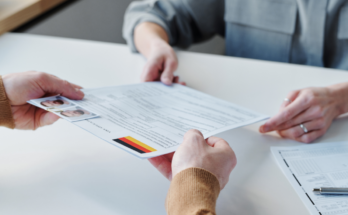Germany Student Visa Requirements: Germany offers world-class education opportunities, attracting thousands of international students each year.
For immigrants, understanding the specific visa requirements is crucial to ensure a smooth transition and compliance with German laws.
Who Needs a Student Visa to Study in Germany?
Navigating the visa requirements for studying in Germany can seem daunting, but understanding who needs a student visa and the distinctions based on one’s origin can simplify the process. Primarily, the need for a student visa in Germany hinges on whether you are an immigrant from within the European Union (EU) or from a non-EU country.
Immigrant Status in German Visa Policies
In the context of German visa policies, an immigrant is generally considered to be a person who intends to reside in Germany for a period longer than the usual tourist visa allows and who does not hold citizenship from an EU country. This includes students who plan to pursue education for an extended period.
Distinction Between EU and Non-EU Students
EU Students: If you are a student from an EU country, Norway, Iceland, Liechtenstein, or Switzerland, you do not need a student visa to study in Germany. However, you must register with the local residents’ registration office and the Aliens’ Registration Authority if your study period exceeds three months.
Non-EU Students: Students from non-EU countries must obtain a student visa before arriving in Germany. The process involves submitting various documents, including proof of admission from a recognized German university, proof of financial resources to cover living expenses, and valid health insurance. Once in Germany, non-EU students must also apply for a residence permit to continue their studies.
However, understanding these key distinctions and preparing accordingly can help ensure a smooth transition to studying in Germany, making your educational journey both exciting and hassle-free.
Types of German Student Visas
Germany offers various types of visas tailored to the diverse needs of international students. Understanding which visa you need is crucial to ensuring a smooth start to your studies in Germany.
German Student Visa (Visum Zur Studienzwecke)
The German Student Visa is specifically designed for international students who have been admitted to a recognized higher education institution in Germany. This visa is suitable for those planning to complete an undergraduate, graduate, or vocational degree in Germany.
Student Applicant Visa (Visum Zur Studienbewerbung)
If you have not yet secured admission to a university but want to apply in person or need to take an entrance examination, the Student Applicant Visa is ideal. This visa allows you to stay in Germany for three months, with a possible extension up to six months, to fulfill the requirements necessary for university admission.
Who Needs Which Visa?
- Non-EU/EEA Students: Most students from non-EU/EEA countries will require a German Student Visa to study in Germany. It’s essential to apply for this visa after receiving an admission letter from a German university.
- EU/EEA/Swiss Students: Students from the European Union (EU), European Economic Area (EEA), and Switzerland do not need a student visa. However, they must register with the local residents’ registration office upon arriving in Germany.
- Students Applying to Multiple Universities: Those who are still finalizing their university choice or need to appear for university entrance exams should opt for the Student Applicant Visa.
Remember to check the specific visa requirements based on your nationality and intended study duration in Germany, as these can influence the application process and documentation needed.
General Requirements for a German Student Visa
Studying in Germany can be a transformative experience, but first, international students must navigate the visa application process. Understanding and preparing the necessary documents and meeting specific requirements are crucial steps. Below, we detail the general requirements for obtaining a German student visa, focusing on documentation, language proficiency, and health insurance mandates.
List of Common Documentation Required
Applicants must provide several critical documents when applying for a German student visa:
- Valid Passport: Your passport must be valid for at least three months beyond your period of stay.
- Visa Application Form: Complete the application form with accurate information.
- Proof of Admission: Evidence of admission from a recognized German institution.
- Proof of Financial Resources: Typically, you must demonstrate financial stability to cover your living expenses for one year, either through a blocked account, scholarship, or a letter of sponsorship.
- Biometric Photos: Recent passport-style photographs.
- Academic Records: Transcripts and certificates from previous educational institutions.
- Proof of Language Proficiency: Depending on your course and institution.
- Proof of Health Insurance: Mandatory for enrollment and visa issuance.
Language Requirements
The language requirements for a German student visa depend largely on the course and institution:
- German-Taught Courses: A proof of proficiency in German, typically a B1 or higher on the Common European Framework of Reference for Languages (CEFR), is required.
- English-Taught Courses: For courses taught in English, a TOEFL or IELTS score may be necessary. Specific score requirements can vary by institution but generally expect a minimum IELTS score of 6.0 or a TOEFL score of 80.
Health Insurance Requirements for Studying in Germany
Health insurance is not just a visa requirement but also a necessity for your safety and wellbeing:
- Public/Private Health Insurance: Students can opt for public health insurance from providers like TK, AOK, or BARMER, which cost about €110 per month for students under 30. Alternatively, private health insurance plans might offer different benefits at varying costs.
- Travel Health Insurance: Applicants need travel health insurance covering the period from their departure to the start of their semester.
By meticulously preparing the required documents, meeting language proficiency standards, and securing adequate health insurance, your journey to studying in Germany will be smoother and more secure.
General Requirements for a German Student Visa
Below, we detail the general requirements for obtaining a German student visa, focusing on documentation, language proficiency, and health insurance mandates.
List of Common Documentation Required
Applicants must provide several critical documents when applying for a German student visa:
- Valid Passport: Your passport must be valid for at least three months beyond your period of stay.
- Visa Application Form: Complete the application form with accurate information.
- Proof of Admission: Evidence of admission from a recognized German institution.
- Proof of Financial Resources: Typically, you must demonstrate financial stability to cover your living expenses for one year, either through a blocked account, scholarship, or a letter of sponsorship.
- Biometric Photos: Recent passport-style photographs.
- Academic Records: Transcripts and certificates from previous educational institutions.
- Proof of Language Proficiency: Depending on your course and institution.
- Proof of Health Insurance: Mandatory for enrollment and visa issuance.
Language Requirements
The language requirements for a German student visa depend largely on the course and institution:
- German-Taught Courses: A proof of proficiency in German, typically a B1 or higher on the Common European Framework of Reference for Languages (CEFR), is required.
- English-Taught Courses: For courses taught in English, a TOEFL or IELTS score may be necessary. Specific score requirements can vary by institution but generally expect a minimum IELTS score of 6.0 or a TOEFL score of 80.
Health Insurance Requirements for Studying in Germany
Health insurance is not just a visa requirement but also a necessity for your safety and wellbeing:
- Public/Private Health Insurance: Students can opt for public health insurance from providers like TK, AOK, or BARMER, which cost about €110 per month for students under 30. Alternatively, private health insurance plans might offer different benefits at varying costs.
- Travel Health Insurance: Applicants need travel health insurance covering the period from their departure to the start of their semester.
By meticulously preparing the required documents, meeting language proficiency standards, and securing adequate health insurance, your journey to studying in Germany will be smoother and more secure.
Step-by-Step Process to Apply for a Student Visa
Applying for a student visa to study in Germany requires careful planning and attention to detail. Follow this detailed guide to navigate through the application process smoothly.
1. Check Eligibility and Gather Documents
Before applying, ensure you meet all the requirements for a German student visa. Typically, you’ll need your passport, proof of admission from a German university, proof of financial resources, health insurance coverage, and passport-sized photos. Check the specific requirements on the official German consulate or embassy website.
2. Visit the German Consulate or Embassy Website
Applications for a student visa should be submitted through the German consulate or embassy in your home country. Visit their official website to find out the application process specifics, download the necessary forms, and book an appointment.
3. Prepare Your Application
Fill out the application form accurately. Attach all required documents, such as your admission letter, proof of financial means (like a blocked account), and a certificate of health insurance. Make sure your documents are neatly organized and complete.
4. Submit Your Application and Attend the Interview
Submit your application at the designated German consulate or embassy. You will likely need to attend an interview where you’ll discuss your study plans and motivation. Be honest and clear in your answers, as this is a crucial part of the application process.
5. Processing Time
After submitting your application, expect to wait approximately 25 days for visa processing. However, times can vary based on the specific consulate and the time of year. Some applications may take up to 12 weeks, especially if additional documentation is required or during peak application periods.
6. Receive Your Visa
Once your application is approved, you’ll be notified to pick up your visa. Ensure you check all the details on the visa sticker to confirm they are correct before you travel.
By following these steps, you can ensure a smoother application process for your German student visa. Start early to allow plenty of time for unexpected delays and to ensure you can commence your studies as planned.
Germany Student Visa Financial Requirements
To obtain a student visa for Germany, applicants must demonstrate their financial stability to cover their living expenses during their study period. This section provides detailed information on the necessary financial requirements and the various proofs accepted by the German Embassy or Consulate.
Proving Financial Stability
When applying for a German student visa, you must prove that you have sufficient funds to support yourself. As of 2024, the estimated cost of living for a student in Germany is around 861 euros per month, amounting to 10,332 euros per year. This figure can vary depending on the city and personal lifestyle.
The Role of the Blocked Account
One of the primary methods to prove financial sufficiency is through a blocked account. Here’s how it works:
- Setup: A blocked account is a special type of bank account that students open in Germany, into which they deposit a specified amount of money.
- Deposit Amount: As of 2024, the minimum deposit required is typically the estimated cost of living for one year (10,332 euros).
- Monthly Withdrawal: Students can withdraw a fixed amount monthly, sufficient to cover their living expenses.
This type of account ensures that the student has a regular source of funds throughout their stay in Germany.
Other Acceptable Financial Proofs
Apart from the blocked account, other financial proofs can be accepted to meet the requirements for a Germany student visa:
- Parental Income Statements: If parents or legal guardians are funding the student’s education, their income statements can be used as proof of financial stability.
- Scholarship Offers: Being a recipient of a scholarship that covers living expenses can also be used to fulfill the financial requirement.
- Bank Guarantees: Some students might opt for a bank guarantee from a recognized bank in Germany as proof of financial resources.
Each of these financial proofs must be detailed and officially authenticated to be accepted by the German authorities. It’s crucial to check the latest guidelines from the German Embassy or Consulate as these requirements can change.
Germany Student Visa Educational Qualifications and Language Proficiency
When applying for a Germany student visa, meeting the educational qualifications and demonstrating sufficient language proficiency are essential steps in the process. Here’s what you need to know:
Academic Records and Certificates
Applicants must provide comprehensive academic records to support their application. This typically includes:
- High School Diploma: An equivalent certificate that meets the German education standards, if applying for undergraduate studies.
- Bachelor’s Degree: Required for those applying to master’s programs, with transcripts showing courses taken and grades received.
- Transcripts and Grades: For all educational levels, detailed transcripts are necessary to showcase your academic performance.
- Certificate of Equivalence: If your qualifications are from outside the EU, you might need a certificate proving that your degree is equivalent to a German qualification.
German Language Skills
For programs taught in German, demonstrating language proficiency is crucial:
- TestDaF or DSH: Most universities require passing one of these official German language tests. The required proficiency level often varies between B2 and C1 of the CEFR, depending on the university and program.
- Proof of Enrollment in Language Courses: If your current language skills do not meet the university’s requirements, you must provide evidence of enrollment in appropriate German language courses.
- Exemptions: If your course is in English, proof of German language proficiency might not be required. However, basic German knowledge is still recommended for daily life and administrative tasks.
However, ensure all documents are accurately translated and certified as per the German consulate’s guidelines to avoid delays in your visa application process.
Tips for Successful Germany Student Visa Application
Securing a student visa for Germany can be a straightforward process with the right preparation and awareness of common pitfalls. Here are some essential tips and advice to help you navigate the application successfully.
Common Pitfalls to Avoid
- Incomplete Documentation: Ensure all required documents are complete and accurate. Missing or incorrect documents are a common reason for application delays or rejections.
- Lack of Financial Proof: You must prove that you have sufficient funds to cover your living expenses in Germany. Provide clear and official financial statements to avoid doubts about your financial stability.
- Poorly Scheduled Appointments: Visa processing times can vary greatly. Schedule your visa appointment early to allow enough time for processing before your intended departure.
- Inconsistent Information: Ensure the information across all forms and documents is consistent. Discrepancies in your application can raise concerns about its legitimacy.
- Language Proficiency Issues: Depending on your chosen program, you may need to provide proof of proficiency in German or English. Failing to meet the language requirements can lead to visa denial.
Tips from Experts and Successful Applicants
- Start Early: Begin gathering your documents and filling out your application as soon as you receive your university admission letter. This gives you ample time to address any issues that might arise.
- Consult with Current Students: Reach out to students who are currently studying in Germany or those who have recently completed their studies. They can offer valuable insights and real-life advice on the visa process.
- Double-Check Requirements: Visa requirements can change. Regularly check the German Embassy’s website for the most current information.
- Prepare for the Interview: Be ready to discuss your study plans, future career goals, and reasons for choosing Germany. A clear and confident response during the interview can make a significant difference.
- Seek Professional Help if Needed: Don’t hesitate to consult with a visa expert if you encounter complex issues during your application process.
By avoiding common mistakes and leveraging advice from those who’ve successfully navigated the process, you can enhance your chances of securing a Germany student visa without unnecessary stress.
What to Do After Receiving Your Germany Student Visa
Congratulations on securing your Germany student visa! Once you’ve received your visa, it’s essential to plan the next steps carefully to ensure a smooth transition to your new academic environment. Here’s what you need to do:
Next Steps After Visa Approval
- Travel Arrangements: Book your flight to Germany well in advance to avoid last-minute hassles and high ticket prices. Aim for an arrival date that gives you enough time to settle in before your studies begin.
- Accommodation: Secure a place to live. Whether it’s a student dormitory, a shared apartment, or a private residence, make sure your accommodation is sorted out before you leave. Many universities offer assistance with housing; take advantage of these services.
- Health Insurance: Register for health insurance in Germany. It’s mandatory for all students to have health insurance coverage. You can either register for public health insurance or opt for a private provider, depending on your needs.
- Finances: Set up a German bank account to manage your expenses more efficiently. Look for banks that offer student accounts with low fees.
- Pack Essentials: Pack appropriately for the weather and cultural norms, and don’t forget to bring all necessary documents, including your visa, passport, university admission letter, and proof of financial resources.
Registration and Residence Permit Process upon Arrival in Germany
- City Registration: One of your first tasks upon arriving in Germany is to register at the local Residents’ Registration Office (Einwohnermeldeamt or Bürgeramt). This is mandatory and should be done within the first week of your arrival. You’ll need your passport, visa, rental contract, and a completed registration form.
- Residence Permit: After registering, apply for a residence permit at the Foreigners’ Registration Office (Ausländerbehörde). For students, this permit is usually granted for the duration of your study program. Required documents typically include your passport, visa, proof of enrollment from your university, proof of health insurance, proof of accommodation, and evidence of sufficient funds.
- University Enrollment: Complete your university enrollment process, which typically involves submitting your documents and receiving your student ID and course materials.
- Orientation Programs: Participate in orientation programs offered by your university. These programs are designed to help you acclimate to the academic system and meet other international students.
By following these steps, you’ll be well-prepared to begin your educational journey in Germany with confidence. Remember, early preparation can make your transition smoother and allow you more time to enjoy your new surroundings.
FAQs about Germany Student Visa Requirements
1. What are the basic requirements for a Germany student visa?
To obtain a student visa for Germany, you must have a valid passport, proof of admission from a recognized German institution, proof of financial means (such as a blocked account), health insurance, and various documents supporting your application. It’s also crucial to show proof of your accommodation and your intention to leave Germany upon completing your studies.
2. How much money do I need to show for my visa application?
As of 2024, students applying for a German visa must demonstrate they have access to at least €11,208 per year, typically through a blocked account. This amount is intended to cover living expenses for one year.
3. How long does it take to process a German student visa?
The processing time for a German student visa can vary, but it generally takes about 25 days. However, it’s advisable to apply at least three months before your intended move to Germany, as delays can occur, especially during peak travel seasons.
4. Can I work in Germany with a student visa?
Yes, international students in Germany are allowed to work part-time. You can work up to 120 full days or 240 half days per year without requiring additional authorization. This allows students to gain work experience and manage their living expenses.
5. What happens if my study program lasts longer than my visa?
If your course extends beyond the duration of your initial visa, you must apply for a residence permit extension at the local Foreigners’ Office in Germany. It’s important to apply before your current visa expires to ensure you remain legally in the country.
6. Is German language proficiency required to obtain a student visa?
German language proficiency is not a mandatory requirement for all study programs. If your course is taught in English and you meet the university’s language requirements, you may not need to prove German proficiency. However, for courses taught in German, you will typically need to demonstrate proficiency through standardized language tests.
Conclusion
In summary, understanding the Germany student visa requirements is crucial for any aspiring student looking to pursue their education in Germany. From gathering the necessary documents such as a valid passport and proof of financial stability, to securing a confirmation of admission from a recognized German institution, each step is vital. It is essential that applicants ensure they meet all the criteria and adhere strictly to the guidelines provided by the German embassy or consulate in their home country.
We encourage all prospective students to thoroughly prepare for the application process. Taking the time to double-check each requirement, prepare for the visa interview, and ensure all paperwork is complete and accurate can significantly ease your journey towards studying in Germany. Remember, meticulous preparation is your best strategy for success in obtaining a Germany student visa. Start your adventure with confidence and enthusiasm—Germany awaits with open arms and abundant academic opportunities.
References
For those looking to delve deeper into the requirements and processes associated with obtaining a student visa for Germany, the following resources offer comprehensive and reliable information:
- German Federal Foreign Office (Auswärtiges Amt) – This official site provides the most accurate and detailed guidelines on visa applications, including student visas. Explore the visa section for up-to-date requirements and application procedures. Visit the German Federal Foreign Office.
- Study in Germany – Managed by the German Academic Exchange Service (DAAD), this platform offers extensive insights into studying in Germany, including necessary preparations and visa application tips for international students. Check out their guidance on Study in Germany.
- Make it in Germany – This portal serves as a comprehensive guide for immigrants, including students, covering everything from visa applications to life in Germany. Useful information can be found under the visa regulations section at Make it in Germany.
These resources are essential for ensuring that the information you gather is accurate and up to date, providing a solid foundation for your journey to studying in Germany.



